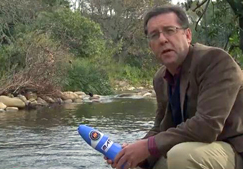Innovations
'Tea bag' filter delivers purified water
Water provision, sustainability
As a past executive vice-president of the International Water Association and a member of Coca-Cola's worldwide panel of water experts, Cloete believes water provision and sustainability go hand in hand. "The lack of availability of adequate, safe and affordable water supplies impacts severely on vulnerable groups such as the poor, the elderly, HIV/Aids patients and children," he said. "More than 90% of all cholera cases are reported in Africa, and 300-million people on our continent do not have access to safe drinking water. Clearly, something has to be done about this." Cloete believes the "tea bag" filter shows the way forward because it represents decentralised, point-of-use technology. It can help meet the needs of people who live or travel in remote areas, or people whose regular water supply is not being treated to potable standards. "It is simply impossible to build purification infrastructure at every polluted stream. So we have to take the solution to the people," he said.Trans-disciplinary initiatives
The invention has become one of the first major projects of the new Stellenbosch University Water Institute, a trans-disciplinary initiative established to intensify the search for lasting solutions to the country and continent's water woes. Cloete, who is the chairperson of the Water Institute, says he got the idea for the filter on an introductory visit to InnovUS, the university's technology transfer company, some 18 months ago. "I was shown the electro-spinning technique of spinning ultra-thin fibres on a nanoscale developed by Dr Eugene Smit of the Department of Chemistry and Polymer Science," he said. "Right away, my mind started churning through the possibilities of how it could be used to clean polluted water."'Off-the-shelf materials'
A research team was put together and, after various trials and experiments, a filter sachet was developed that not only resembles a tea bag in shape and size, but is made of the same biodegradable material as off-the-shelf rooibos tea bags:- The inside of the tea bag material is coated with a thin film of biocides encapsulated within minute nanofibres, which kills all disease-causing microbes.
- The bag is filled not with tea leaves but with active carbon granules that remove all harmful chemicals, for instance endocrine disruptors.
- Each "tea bag" filter can clean one litre of the most polluted water to the point where it is 100% safe to drink.
- Once used, the bag is thrown away, and a new one is inserted into the bottle neck.
HOPE Project
The Stellenbosch University Water Institute and its "tea bag" water filter form part of its HOPE Project, a set of development goals aimed at improving lives in South Africa and the rest of the continent. "We firmly believe that science should serve the needs of society. By aligning the expertise of our scientists with the national and international development agenda, we want to become more relevant to society," said Professor Russel Botman, rector and vice-chancellor of the University. SAinfo reporter
Would you like to use
this article in your publication or on your website? See: Using SAinfo material

Stellenbosch University's Professor Eugene Cloete, inventor of a high-tech 'tea bag' filter that fits into the neck of a bottle and delivers clean water as you drink from it (Photo: HOPE Project)
Related links
Related articles
- Innovation legacy of World Cup
- SA moves to secure water supply
- CSIR laser technology a 'world first'
- Thumbs up for South Africa's tap water
- IBM's second Africa innovation centre
- Vodacom launches ICT innovation unit
- South Africa aims for biotech top 10
- Lift-off for South Africa's satellite
- SA firm wins inventor award
- Africa's biggest supercomputer
- Cisco to build R215m innovation centre
- Microsoft's Africa innovation centres
- SA's micro-manufacturing lab
- SA gears for a nano future




